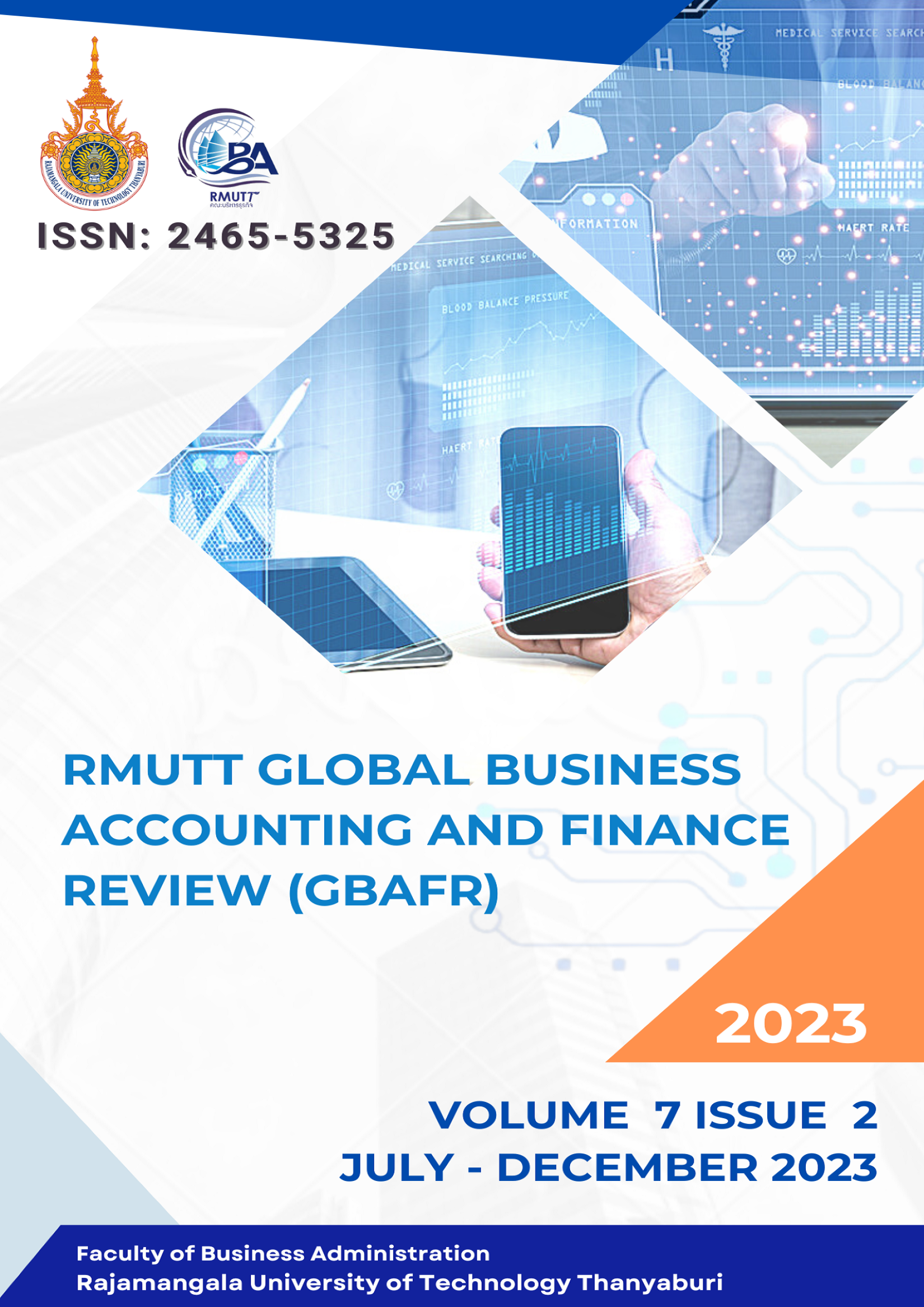ESG PERFORMANCE IMPACTING ON SYSTEMATIC RISK OF THE LISTED COMPANIES ON THE STOCK EXCHANGE OF THAILAND
DOI:
https://doi.org/10.60101/gbafr.2023.271107Keywords:
Environmental, Social and governance: ESG, Systematic risk, ESG performanceAbstract
Purpose – The research aims to examine the effect of the performance of environmental, social, and corporate governance (ESG) on the systematic risk of the listed companies on the Stock Exchange of Thailand (SET).
Methodology – The sample data included 158 listed companies on the SET in 2022. Collected annual data were retrieved from financial statements and the stock exchange database system (SETSMART). The statistics used for analysis were descriptive statistics and inference statistics. Descriptive statistics included mean, standard deviation, maximum, and minimum, while inference statistics included correlation analysis and multiple regression analysis.
Results – The research results found that the mean of ESG performance in terms of ESG book and Refinitiv were quite equal at 54.25 and 53.49, respectively. The ESG performance in terms of the ESG book provided a negative relationship with systematic risks at the statistically significant.05 level, while the ESG performance in terms of Refinitiv showed no significant relationship with systematic risks. Interestingly, only the listed companies in the technology sector showed a positive relationship with systematic risks at a.01 statistically significant level.
Implications – The critical role of corporate ESG information is to assess a company’s long-term performance for sustainable growth. Therefore, the stock exchange of Thailand must provide knowledge about ESG indices to listed companies and investors to achieve sustainability for both business organizations and investors.
Originality/Value – This empirical study contributes as a specification model to explain how ESG performance impacts systematic risk. Additionally, the different ESG indices provide different results. This implies that a deep understanding of the ESG indices is necessary for listed companies and investors.
References
Almeyda, R., & Darmansyah, A. (2019). The influence of environmental, social, and governance (esg) disclosure on firm financial performance. Journal of Proceedings Series, 5(5), 278–290.
Amatayakul, K. Pongsupatt, T., & Pongsupatt, A. (2021). Factors affecting sustainable growth of sustainable investment group in the stock exchange of Thailand. Journal of Buddhist Education and Research, 7(3), 77-91.
Arvidsson, S., & Dumay, J. (2022). Corporate ESG reporting quantity, quality, and performance: Where to know for environmental policy and practice?. Business Strategy and the Environment, 31(3), 1091–1110.
Broadstock, D, C., Chan, K, Cheng, L. T.W., & Wang, X. (2021). The role of ESG performance during times of financial crisis: Evidence from COVID-19 in China. Finance Research Letters, 38, 101716.
Chueathong, P, and Bunworachot, T. (2023). The relationship between added business value and operating results of listed companies in the sustainable stock group. National and International Conference on Humanities and Social Sciences.
Fama, E. F., & French, K. R. (2004). The Capital Asset Pricing Model: Theory and Evidence. Journal of Economic Perspectives, 18(3), 25-46.
Freeman, R. E. (1984). Strategic management: A stakeholder approach. Pitman.
Freeman, R. E. E., & McVea, J. (2001). A Stakeholder Approach to Strategic Management. Electronic Journal. https://doi.org/10.2139/ssrn.263511
Jaimuk, P., Nilapornkul, N., & Ngudgratoke, S. (2020). Impact of A Mediator on corporate governance characteristics and real earning management of Thai listed companies. Test Engineering and Management, 83(1), 5912-5924.
Jaisard, N. (2022). Relationship between Financial Performance and Environment, Social and Governance of Listed Companies in Thailand. In The 17th UTCC National Graduate Research Conference (pp 56 – 64). Bangkok, Thailand.
Kongsakul, J. (2019). Invest sustainably with ESG guidelines. Office of the Securities and Exchange Commission (SEC). https://www.sec.or.th/TH/Pages/SustainableFinance.aspx
Lee, M. C., & Su, L. E. (2014). Capital Market Line Based on Efficient Frontier of Portfolio with Borrowing and Lending Rate. Journal of Accounting and Finance, 2, 69-76.
Meiryani, O., Sudrajat, J,. & Daud, Z. M. (2020). The Effect of Firm’s Size on Corporate Performance. International Journal of Advanced Computer Science and Applications, 11(5), 272-277.
Nilapornkul, N. (2019). The effect of information communication technology and cash conversion cycle on firm performance. International Journal of Applied Computer Technology and Information Systems, 9(1), 82- 86.
Noknoi, J. (2015). Corporate Social Responsibility: Concept and Experiences. University of the Thai Chamber of Commerce Journal Humanities and Social Sciences, 3(35), 154-163.
Phokchai, T. (2021). How can investing in ESG stocks reduce risk?. https://www.setinvestnow.com/th/knowledge/article/69-how-esg-stock-investment-reduces-risks
Rakpanichmanee, S., Thamsiri, W., & Duangchaiyosuk, S. (2019). Relationship between social responsibility performance and financial performance of listed companies in Thailand. Nida Business Journal, 25, 140-157.
Stock Exchange of Thailand (SET). Sustainable stocks – Thailand Sustainability Investment (THSI). https://setsustainability.com/page/thsi-thailand-sustainability-investment
Sudcharoen, P. (2021). The impact of environmental, social, and corporate governance (ESG) responsibility levels on operating results through risks of companies listed on the Stock Exchange of Thailand (SET) [Unpublished doctoral dissertation]. Thammasat University.
Suttipun, M. (2023). ESG Performance and Corporate Financial Risk of the Alternative Capital Market in Thailand. Cogent Business & Management, 10(1), 2168290.
Velte, P. (2017). Does ESG performance have an impact on financial performance? Evidence from Germany. Journal of Global Responsibility, 8(2), 169-178.
Downloads
Published
How to Cite
Issue
Section
License
Copyright (c) 2023 Faculty of Business Administration, Rajamangala University of Technology Thanyaburi

This work is licensed under a Creative Commons Attribution-NonCommercial-NoDerivatives 4.0 International License.









